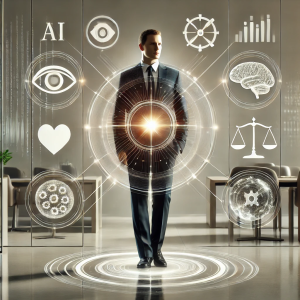Widgetized Section
Go to Admin » Appearance » Widgets » and move Gabfire Widget: Social into that MastheadOverlay zone
Superpowers for Public Servants in the Age of Artificial Intelligence. Part I
The views expressed are those of the author and do not necessarily reflect the views of ASPA as an organization.
By Mauricio Covarrubias
October 11, 2024

The integration of artificial intelligence (AI) into public administration is emerging as a key driver in the transformation of the governmental sector in the 21st century. Often, AI is viewed through two lenses: the utopian optimism of a future powered by technology or the apocalyptic fear of a society controlled by machines. This contrast has been explored in the article Perspectives on Artificial Intelligence: Between Iron Man and Terminator, which analyzes how AI is impacting various sectors of society, including the public sphere.
However, in the governmental context, the real challenge lies not so much in the general risks or benefits of AI, but in the ability of public servants to leverage this technology and transform their functions. AI offers far more than a mere operational tool; it provides the possibility to extend and amplify human capabilities, granting public servants what we might call “superpowers.” These powers not only optimize efficiency, streamlining operations, but can also radically transform the social impact of public servants by allowing them to tackle complex issues with greater precision and insight.
As governments integrate AI, the need to rethink the role of public servants in the digital age becomes evident. Public servants must adapt to these innovations to meet the evolving demands of governance. In this context, as mentioned in The New Role of the Public Servant in the Digital Age, public officials need to be trained to manage technological tools that improve the efficiency and quality of services offered to citizens. The following seven superpowers illustrate how AI can enhance the ability of officials to respond to the challenges of the 21st century in an ethical, effective, and equitable manner.
Superpower 1: Expanded Vision
The first AI superpower for public servants is “expanded vision.” This refers to AI’s ability to process vast amounts of data in real time, providing a deeper understanding of complex phenomena. In areas such as public health, security or climate change, AI enables the detection of hidden patterns and the prediction of future trends.
Using tools like big data not only allows governments to anticipate emerging problems but also facilitates the creation of more precise, evidence-based policies. For example, in disaster management, AI can predict catastrophic events like hurricanes or earthquakes, helping governments take preventive measures that save lives and reduce recovery costs. By empowering public servants with this expanded vision, AI fosters a proactive approach to governance, enabling better-prepared responses to societal challenges.
Superpower 2: Infallible Decision-Making
Another crucial superpower is “infallible decision-making.” In the public sector, decision-making often faces uncertainty and human bias. AI, by processing multiple variables simultaneously and offering predictive analysis, can minimize errors and optimize citizen well-being.
This capability is particularly useful in urban planning, where data on traffic, pollution and mobility are integrated to design smarter, more sustainable cities. AI can overcome the limitations of Herbert Simon’s “bounded rationality,” providing public servants with the ability to make more rational and well-founded decisions. This power could help public administrators develop long-term strategies that benefit not only current populations but future generations as well.
Superpower 3: Omnipresent Presence
The superpower of “omnipresent presence” transforms the interaction between the government and its citizens. Thanks to AI, public services can be available 24/7 through chatbots and virtual assistants, which respond to inquiries and process transactions continuously. This constant access not only improves efficiency but also removes traditional barriers of office hours and location, allowing citizens to interact with the government at any time.
However, this capability raises ethical challenges related to privacy and technological dependency. It is essential for governments to properly manage these risks to maintain citizen trust and ensure that AI is used responsibly. Effective oversight and robust frameworks are necessary to prevent over-reliance on technology while still reaping its benefits.
Superpower 4: Empathetic Communication
Although machines are traditionally perceived as cold and impersonal, AI has the potential to enhance “empathetic communication” in public administration. Advances in natural language processing allow AI systems to interpret and respond to citizens’ emotions, tailoring interactions to the emotional context.
This superpower is particularly valuable in areas like health and social welfare services, where empathetic care can improve the citizen experience. However, it is important for public servants to supervise these systems to prevent emotional manipulation and ensure the dignity of citizens. Empathy, guided by technology but human-led, could redefine how governments connect with their constituents.
In the second part of this column, we will explore more superpowers that artificial intelligence can grant to public servants as they face the challenges of the 21st century.
Author: Mauricio Covarrubias is Professor at the National Institute of Public Administration in Mexico. He is co-founder of the International Academy of Political-Administrative Sciences (IAPAS). He is the founder and Editor of the International Journal of Studies on Educational Systems (RIESED). Member of the National System of Researchers of CONACYT. He received his Ph.D. from the National Autonomous University of Mexico. He can be reached at [email protected] and followed on Twitter @OMCovarrubias


Follow Us!